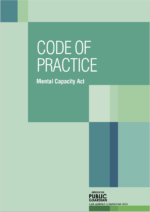
Caregivers want their loved ones to live in the environment most comfortable to them, which is usually home. However, circumstances might call for a person living with dementia to move into a nursing home if their needs cannot be met at home. Find out more about when you might need to consider having your loved one move, and how you can support them throughout the process.
Why move into a nursing home?
It is advisable for persons living with dementia to live at home so that they age in place with an environment that is familiar and comfortable to them. However, certain circumstances may make your loved one’s move to a nursing home necessary. Such situations include:
- If the primary caregiver can no longer provide care that the person needs to live well
- If the person with dementia lives alone, but requires additional care that is too costly or difficult to access from home because they are wheelchair or bed-bound
- If community services are unable to meet their needs adequately
- Safety concerns when the caregiver is unable to cope with severe behavioural and psychological symptoms of dementia (BPSDs) or sundowning experienced by the person living with dementia
Allied healthcare professionals may advise a change of living arrangement with the following considerations, in order of priority:
- Medical health of the person living with dementia
- Psychoemotional needs of the caregiver (whether the caregiver’s ability to cope with stress, maintain personal relationships and quality of life is impacted by the current caregiving arrangement)
- Functional status (ability to carry out activities of daily living) and the safety of the person living with dementia
- Socio-economic considerations
Sudden changes in the person with dementia or the caregiver’s health may require the person living with dementia to change living arrangements. It is hence best to prepare for these situations ahead of time and select the best nursing home for your loved one’s needs by discussing their long-term care plans with them while they still retain mental capacity.
Who makes the decision to move?
The decision should always be left to the person living with dementia, as long as they have been assessed to retain mental capacity. This means that they are judged to still be capable of making important decisions. They must be able to understand information and weigh options, as well as communicate their decision. However, if the person living with dementia has lost the mental capacity required to make this decision, the Lasting Power of Attorney (LPA) donee can make this decision on their behalf. If the person living with dementia has not appointed anyone as their LPA donee, health and social service professionals can advise their next-of-kin on this decision. If a person living with dementia no longer has mental capacity and has lost contact with their next-of-kin, then a professional body may be appointed as the donee. They are then referred to as a public trustee.
For more information about the Mental Capacity Act, please refer to the Code of Practice.

Code Of Practice – Mental Capacity Act
Source: Office of the Public Guardian
The code of practice elaborates on the Mental Capacity Act, especially in how it is applied to actual situations. It helps professionals, paid caregivers, informal caregivers, family and friends of the person understand their roles and responsibilities under the act to safeguard the interests of the person lacking mental capacity.
It is common for caregivers to feel worried about the changes that living with a loved one with dementia may bring. Many also feel guilt over the decision to move their loved one into a nursing home, even when it is in their loved one’s best interests.
How should the move to a nursing home be carried out?
Your loved one will go through a period of adjustment when they enter the nursing home. Nursing Home Respite Care is a service which offers short-term care for persons living with dementia, and can range in duration from several days up to a maximum duration of one month. Although this is mainly meant to provide respite for caregivers when they are temporarily unable to provide care, it may be a good way to see how your loved one responds to the care environment in a nursing home and for families to ease into the change. To be eligible for respite care options, your loved one must meet some minimum criteria:
- Has moderate to high nursing care needs
- Must have a discharge care plan after the end of the respite care period (they must have a permanent place of stay they can return to)
- Application requires medical records
Often, the application to a nursing home is done through communication with a social worker. As part of the application, a needs assessment will be conducted to assess your loved one’s fit for respite or nursing home programmes, as well as a family conference to hear the opinion of everyone involved. You can find out more about the application criteria here.
You or any authorised caregiver also needs to provide your loved one’s recent (dated no earlier than six months from submission of the application) medical report, which must include the following:You can also use your loved one’s hospital discharge summary if they were discharged within the past six months of application. All of these documents can be provided by your loved one’s primary physician.
- Diagnosis
- Clinical History
- Current functional status
- Required nursing procedures
- Drug allergy history (including list of currently prescribed medications)
- Cognitive and behavioural symptoms (if applicable)
- Results from a chest X-Ray (negative for infectious disease)
- COVID-19 vaccination information (full vaccination status required)
Nursing homes will prioritise applications based on your loved one’s fit for criteria. Some nursing homes have specialised dementia wards for those who are mobile but may have behaviours that make them unsuitable for general wards. Priority is usually given to wheelchair- or bed-bound seniors for public nursing homes. For private nursing homes, anyone can apply.
You can speak to a care consultant at AIC Links to find more information about making the change in living arrangement. Alternatively, you can speak to a medical social worker at a polyclinic during your loved one’s scheduled doctor’s visits.
Addressing your loved one's needs during the move
Your loved one will be quite limited in the number of personal possessions they are able to bring into the nursing home when admitted. Often, they are only allotted one wardrobe, or even simply a drawer for personal clothing. They are also not able to bring pets with them, which is another consideration if your loved one is very attached to a family pet. Wherever possible, you should also consider whether the faith and language preferences of your loved one match the nursing home you are applying to. There are several nursing homes affiliated with faith-based organisations.
After the move, speak to the person living with dementia to find out how they feel about the move as early as possible. Many seniors experience relocation stress when moving into a nursing home, although the adjustment period is different for everyone. Some nursing homes also have support groups for family and friends of the home’s residents, which may help if you are feeling anxious over the decision. Talk to the care home nurses/staff about your loved one’s life history and interests. You can still remain actively involved in your loved one’s care even after they move into a nursing home.
Moving from the Nursing Home back to home
You or any authorised caregiver also needs to provide your loved one’s recent (dated no earlier than six months from submission of the application) medical report, which must include the following:It is uncommon for persons living with dementia to transfer from the nursing home back to the home setting. In the case that occurs, the caregiver/guardian should have a conversation with the care team at the nursing home as part of discharge care planning. You may also arrange for an occupational therapist to make a home visit and recommend necessary changes to make the home safer for your loved one. If you are considering moving your loved one back home, you may apply for home leave from the nursing home so they can adapt to the change. Under home leave, residents from a nursing home are temporarily discharged to stay at home.
For more information on the support services available, contact a Community Outreach Team (CREST).
Financial support for application to nursing homes
Nursing homes can be very expensive. Before subsidies, the average cost per month is $4,000 for public nursing homes. Singaporean citizens and Permanent Residents are eligible for between 10-75% subsidy for nursing homes depending on monthly household income per person. A table of subsidy levels can be found on the Ministry of Health’s website.
Other Financial Support
- Moderate/mild disability: Pioneer Generation Disability Scheme
- Severe disability: Interim Disability Assistance Programme for the Elderly/ElderFund, MediSave Care, Pioneer Generation Disability Scheme
You can find a more detailed list of financial schemes here.
Other options
It is always best for persons living with dementia to age in place whenever possible. If your loved one does not require nursing care but have high care needs, there are several services that can offer the support they need for daily activities of living, including:
If they have difficulty with a few ADLs, You can apply for an Integrated Home and Day Care (IHDC) package, which combines different home-based and centre-based care services suited to your loved one’s needs. If you provide care for your loved one at home with the aid of a domestic worker, you are also eligible for the Home Caregiving Grant and Migrant Domestic Worker (MDW) Levy Concession in addition to the schemes listed under Other Financial Support above.
You may also consider assisted living facilities, such as St. Bernadette’s Lifestyle Village or Red Crowns Assisted Living. These facilities are communal living spaces that offer the services mentioned above including housekeeping. It is intended for those who require assistance with ADLs but not nursing or medical care, and can offer residents more independence and privacy compared to a nursing home.
If your loved one is living alone and prefers to continue to do so, you can arrange for befriending services or for a community nurse to make regular visits. You can also get your loved one connected to a Community Case Management Service (CCMS) team for care coordination. The CCMS provider depends on the region of your loved one’s residence, so you can speak to an AIC care consultant to find out more or get a referral from your loved one’s GP.
You can also apply for the Home Monitoring System (HoME+) by the Singapore Red Cross, which is a non-invasive system that uses motion sensors and a panic button to monitor your loved one’s safety and assist them in cases of emergency. However, this service requires you to have a Wi-Fi network set up in your home. Wait time from the point of application for HoME+ can take up to six months.
Singapore Red Cross HoME+
HoME+ helps seniors living on their own, through a helpline and a monitoring, alert and response system for home safety. It offers 100% privacy (no CCTV), and empowers the elderly with greater freedom and security in their own homes. The system features 2 motion sensors, 1 door sensor, 1 gateway and 1 duress button, entirely supported by a call center, community responders and Red Cross’ ambulance services.
Additional Resources
FINDING A NURSING HOME | Connecting Caregiver Tips
For those caring for persons living with dementia, choosing a nursing home may become an eventual necessity.
Patsy Chia was a caregiver to her mother for more than 10 years. She narrows down the factors in finding a nursing home for your loved one, and how families can provide care and concern even if their loved one is not living at home.
Tell us how we can improve?
Ministry of Health. Subsidies for Residential Long-Term care services. (n.d.). https://www.moh.gov.sg/healthcare-schemes-subsidies/subsidies-for-residential-long-term-care-services
Bursack, C. B. (2020, May 21). Coping with the Decision to Put Your Parent in a Nursing Home.
AgingCare. https://www.agingcare.com/articles/coping-with-nursing-home-decision-149754.htmYeo, J. (2023, January 12). Everything You Need to Know About Nursing Homes in Singapore. NTUC Income. https://www.income.com.sg/blog/nursing-homes-in-singapore




